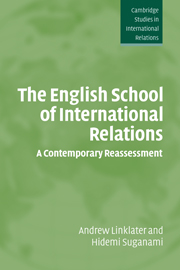Book contents
- Frontmatter
- Contents
- Acknowledgements
- Introduction
- 1 The idea of ‘the English School’ as a historical construct
- 2 The argument of the English School
- 3 The English School on ‘International Relations as an intellectual pursuit’
- 4 Progress and its limits: system, society and community in world politics
- 5 Cosmopolitanism and the harm principle in world politics
- 6 The sociology of states-systems
- 7 The good international citizen and the transformation of international society
- Conclusion
- Bibliography
- Index
- CAMBRIDGE STUDIES IN INTERNATIONAL RELATIONS
Conclusion
Published online by Cambridge University Press: 22 September 2009
- Frontmatter
- Contents
- Acknowledgements
- Introduction
- 1 The idea of ‘the English School’ as a historical construct
- 2 The argument of the English School
- 3 The English School on ‘International Relations as an intellectual pursuit’
- 4 Progress and its limits: system, society and community in world politics
- 5 Cosmopolitanism and the harm principle in world politics
- 6 The sociology of states-systems
- 7 The good international citizen and the transformation of international society
- Conclusion
- Bibliography
- Index
- CAMBRIDGE STUDIES IN INTERNATIONAL RELATIONS
Summary
This book has aimed to give a comprehensive account of the English School's study of international relations and to explore how a historically based and normatively progressivist perspective may be extrapolated and developed further from its existing achievements. The discussion began with a detailed account of the changing identity of the English School. The range of questions the School's leading figures have addressed, and the answers they have suggested, were then outlined. And the book moved to a close scrutiny of the epistemological and methodological parameters within which the School's key authors have made contributions to the study of their subject-matter.
It is often enough stated that, in discussing the achievements of the English School, the question of ‘who is in and who is out’ is not an issue worth spending time on (Little, 2003: 444). The point of such a remark may be that any answer given to the question of which figures are more, or less, central to the story of the English School cannot but be arbitrary. Against this scepticism, Chapter 1 argued that, despite a remarkably diverse range of interpretations concerning the English School's identity which have been aired in the last twenty years or so, a defensible picture of the School's identity emerges when these contending interpretations are carefully scrutinized.
The English School, it was suggested, was a historically evolving cluster of so far mainly UK-based contributors to International Relations, initially active in the latter part of the twentieth century, who broadly agree in treating the international society perspective – or ‘rationalism’ in Wight's sense – as a particularly important way to interpret world politics.
- Type
- Chapter
- Information
- The English School of International RelationsA Contemporary Reassessment, pp. 259 - 272Publisher: Cambridge University PressPrint publication year: 2006



